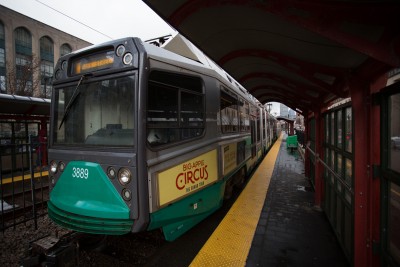
The Massachusetts Bay Transportation Authority released a Fiscal Year 2017 preliminary budget Tuesday that outlines how the MBTA plans to reduce its deficit and increase revenue, according to a Tuesday press release.
The MBTA has reduced its deficit from an original estimate of $242 million to $80 million, according to the release. The budget also says the MBTA raised an additional $10 million from advertising and is projected to receive $43 million from a 9.3 percent fare increase.
According to the release, revenue from increased fares will go toward the Capital Maintenance Fund, which is money that is reserved for improving the MBTA. The MBTA projects that a total of $100 million of “Pay-go” capital will be transferred into this fund to upgrade old technology that contributes to delays in service.
MBTA spokesperson Jason Johnson explained in an email that the revenue will help improve maintenance and that some of the changes in the budget include decreasing employee costs.
“Some of the revenue will go towards a $26 million program to complete improvements in track, third rail and other equipment,” Johnson wrote in the email. “The release … outlines the main cuts and savings in areas such as overtime and own-source revenue, as well as the transfer of $48 million in employee costs being transferred from the capital to the operating budget.”
Oscar Brookins, a professor at Northeastern University, wrote in an email that he wonders about the feasibility of the projected revenue of $43 million from fare increases.
“Using price elasticity studies of transit, the 9.3% increase in fares would initially raise revenue about 6% in the short run, but over time as riders find alternatives there might only be a 2.5% increase in fare revenue,” Brookins wrote in the email.
Brookins also discussed how the projected revenue in the budget seems unlikely with the MBTA’s current total fare collections.
“MBTA figures show current collections of $602 million so they must be using a somewhat more optimistic elasticity,” Brookins wrote in the email. “Using $43 million as 6% of current revenue suggests that current fare collections would need to be a whopping $700 million in the short run and $1.7 billion in the long run. Given the longer run response, the $43 million seems unrealistically large.”
Charlie Ticotsky, policy director of Transportation for Massachusetts, said the efforts the MBTA is making to decrease costs may pose hardships on riders.
“We are concerned that some of the ways they’re raising money, such as service cuts and fare increases, would be detrimental to riders.” Ticotsky said, “We applaud them for the seriousness in which they’ve undertaken the task of finding savings and we support the idea of putting money into capital improvements, but the burden shouldn’t be entirely on the riders through service cuts and fare increases.”
Ticotsky also talked about money the MBTA receives that is not reflected in the budget.
“The MBTA is receiving $187 million from the legislature every year that they’re not counting in the deficit, so when you include that amount, there is actually a surplus,” Ticotsky said.
Several Boston residents shared their thoughts regarding the MBTA’s efforts to increase revenue.
Tam Nguyen, 25, of Brighton, said the trains are unreliable, and he would like to see money used to improve them.
“I live closer to the Green Line, and it’s not a good train because stops are really close to each other,” he said. “There are delays, and sometimes there’s something wrong with them. So I’m hoping that by raising the fees, they can try to improve that.”
Olivia Chin, 26, of Allston, said the MBTA should focus on maintenance upkeep.
“I understand why they need to raise fares, but the MBTA has been very inconsistent,” she said. “They need to focus on maintenance. The T is just not equipped to handle the weather.”
Meghan Lowell, 24, of Brighton, said that there are other ways for the MBTA to cut costs.
“I think better fiscal management is the answer,” she said. “I haven’t seen their budget, but I’m sure there is extraneous spending and overhead costs that can be lowered. There are different ways to reduce debt that are not increasing the fares.”
Kyler Sumter contributed to the reporting of this article.




